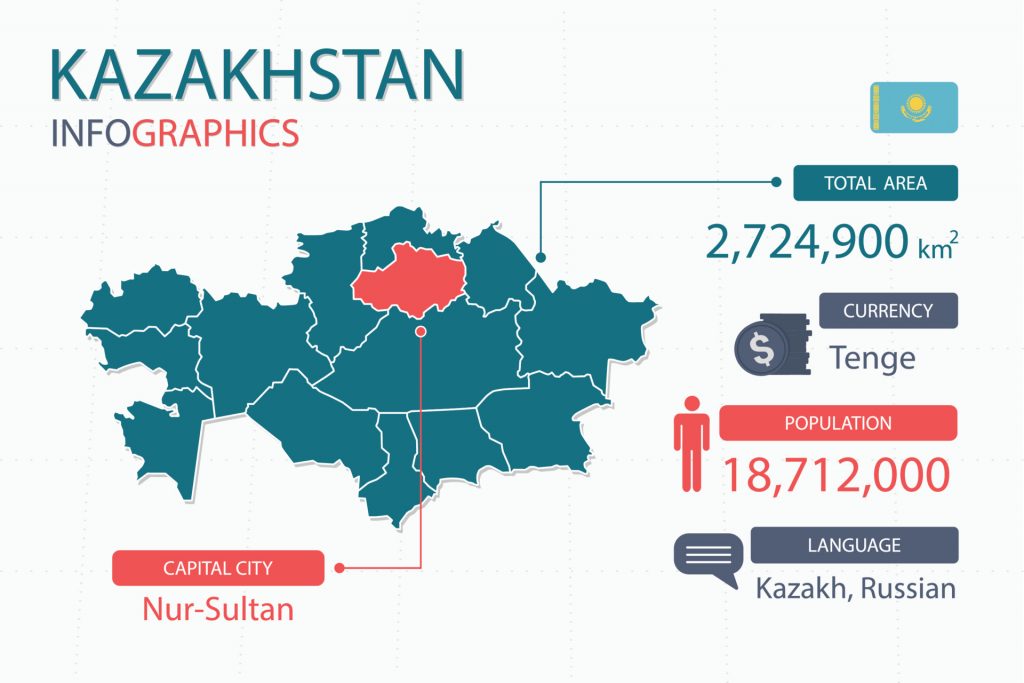The origins of the Kazakh Language
The Kazakh language is the official language of the Republic of Kazakhstan. It is also spoken in other areas, especially in the Xinjiang region of China, the Bayan Olgii Province in Mongolia, and some other areas in the former Soviet Union. In addition, speakers of Kazakh can be found in Afghanistan, Iran, Germany, and Turkey.
Kazakh stems from the Turkic family of languages. It is a considered an agglutinative language, meaning that suffixes can be added to words to form more complex meanings. Other agglutinative languages include Japanese and Korean. In general, it is a language where the verb comes at the end of the sentence, but there is quite a flexible word order.
Kazakh is currently written with three different writing systems, Cyrillic, the Latin alphabet, and Arabic. What system is used varies mostly by region. The Arabic script is used in regions in Afghanistan, China, and Iran, while Cyrillic is being used in Bayan Olgii Province in Mongolia. In Kazakhstan, Kazakh may be in a unique situation in terms of writing as it is in the process of transferring from one script to a newer script. Up until October 2017, it has been written using Cyrillic, the same script used to write Russian and a number of other languages that are associated with countries of the former Soviet bloc. However, due to presidential decree, Kazakh will be officially written using the Latin script in Kazakhstan. The goal proposed by the President is to have the transition completed by 2025. However, in other Kazakh-speaking regions, Cyrillic will most likely remain prominent without the political weight behind such an ambitious shift.

Further distinguishing Maltese from varieties of Arabic is the writing system. Throughout history, the Latin script has been used to write Maltese. In fact, it is the only Semitic language that is written with the Latin script. The modern orthography was introduced in 1942 and it contains thirty letters. In addition to the standard set, there are additional letters that are derivative of the original Latin letters. Interestingly, there is no C, but rather there is a C with a dot on top, which makes a sound like the ‘ch’ in the word ‘church’. There are also accent marks to indicate the stress on syllables in certain words. Maltese is written from left-to-right. Throughout history, written Maltese and spoken Maltese have been quite different, with many linguists characterizing the language as one that is diglossic, a situation where written and spoken registers are so different that they are at times not mutually intelligible.
The Maltese language can be traced back to the early eleventh century. In Sicily, Siculo-Arabic was spoken due to the Moorish conquest. The Muslims who occupied this area spoke this dialect of Arabic. A number of settlers moved from Sicily to Malta, and those communities brought their native language with them. These settlers were not all Muslims, even though they may have shared cultural and linguistic roots. In the late century, due to the Norman conquest and the following expulsion of Muslims from the general area of Malta and Sicily, the Maltese speaking community was isolated from its linguistic mother of Arabic. Thus, Maltese evolved distinctly from other forms of Arabic. Rather, it developed alongside Italian dialects that were prominent at the time.
The first written record of the language was documented in a will that was written in 1436. In this will, the language was referred to as the Maltese language. A dictionary dating back to the sixteenth-century was also discovered. This dictionary was a bilingual dictionary between Maltese and Italian. Other linguistic references have been published over the centuries including additional dictionaries and grammars.
Nowadays, Maltese is spoken mainly in Malta. However, many Maltese communities exist in other countries. Italy, Australia, the United Kingdom, and the United States all have Maltese speaking communities. In Malta, there also exists a number of dialects. Urban dialects have emerged, but they are close to the standard language. More rural dialects also exist, and these dialects tend to conserve their Arabic roots in terms of linguistic structures and vocabulary.
The linguistic situation in Malta is as unique as its national language. As Malta is a multilingual country, Maltese is not the only language that exists in mass media. English and Italian are also prominent. In addition, radio and TV stations from Italy also are broadcasted in Malta because of the two countries’ close proximity to one another. English and Maltese seem to be used equally in mass media, especially in newspapers. In addition, even though the internet tends to be a vehicle of language diffusion.
Given this linguistic situation, the general population is both fluent in both Maltese and English and everyday parlance exhibits much code-switching depending on the register and social situation. Nevertheless, Maltese still has a long history of literature that dates back to 1470. There is also a flourishing literary tradition, with the first novel being published in 1863. After the two World Wars, contemporary literature has also been produced in the language. In fact, while Maltese and English compete in terms of general media, the literature that comes from Malta is mostly in the Maltese language, with a few works in English and Italian. In a way, Maltese has become a language of literary prestige in Malta. With so many writers and speakers exhibiting pride over the use of the language, Maltese will remain a crucial part of the identity of Malta.
VEQTA can provide you with a perfect Kazakh translator for your Kazakh translation, English to Kazakh translation and Kazakh to english translation for the your targeted locale. Our translations to Kazakh are created with your target audience in mind to meet your expectations.
If you need to translate Kazakh – Get in touch today!
A dedicated team of Kazakh translators who combines Experience, Specialized Subject Matter Expertise with best Translation Practices to deliver quality second to none.
Kazakh Subject Expertise
Kazakh Translators
Kazakh Editors
Kazakh Copywriters
Kazakh Reviewers
Kazakh Voice dubbing
Kazakh Subtitling
Kazakh Transcription


